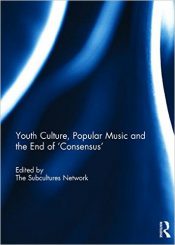The seven concise chapters of the book at hand actually represent a special issue of Contemporary British History (26.3) from 2012. They were conceived as the results of a symposium devoted to examining youth-associated cultural responses to the political, economic and socio-cultural changes that transformed Britain in the aftermath of WWII.
The post-war consensus (1945-1979), a more or less stable balance of power between Conservative and Labour that mostly aimed at a strong economy that also could support means for a welfare state, is at the center of all the single studies compiled here.
 With the election of Margaret Thatcher, the census ceased to exist; this was the beginning of harsh times and heavy social uproars, that for many people – particularly those with a low income – had Thatcher identified as probably the most despised person in the whole UK. With this background, the many youth cultures such as punk, skinhead and many others are studied here, whereas pre-1979 youth cultures – also analyzed here – had mostly different political and social motivations.
With the election of Margaret Thatcher, the census ceased to exist; this was the beginning of harsh times and heavy social uproars, that for many people – particularly those with a low income – had Thatcher identified as probably the most despised person in the whole UK. With this background, the many youth cultures such as punk, skinhead and many others are studied here, whereas pre-1979 youth cultures – also analyzed here – had mostly different political and social motivations.
While all the pieces assembled in the volume are truly worth reading, the paper on the working-class experience centered lyrics of Ray Davies, singer of the prominent and brilliant sixties band The Kinks, stands out. His lyrical output, compared to the social studies of Richard Hoggart, paints a different and very particular picture of working-class reality in the late 1960s when society was in a state of extreme transition.
Bill Osgerby’s piece on the so-called “Bovver” books of the 1970s, where British subcultures and youth cultures were portrayed and which spread the news about bikers, skinheads, rude boys and suedeheads on a large scale is probably the highlight of the book at hand. One prominent “author” of such novels with largely simplistic plots that center around parties, music, violence, sex and dress code was one Richard Allen; who actually never existed but was the pen name of Canadian-born writer James Moffat who probably never ever met a skinhead. Many of the “Bovver”(slg. for a heavy boot, often steel-toed) titles were delivered by publisher New England Library.
Selling in the millions (as did “Skinhead” in 1970), the hysterical idea that England was about to be overrun by battalions of aggressive and violent youngsters was pushed by these cheap books. To a certain extent they were very similar to some of the American pulp books, although those mostly lacked the political edge. Osgerby’s text offers very interesting 32 pages on the “youth-sploitation” in England.
The other chapters deal with the punk movement, the influence of black culture in England with the role of the DJ and the spread of Jamaican-influenced styles of dressing and music appreciation, feminist positions and voices in the context of the 1980s young women magazine Shocking Pink and the unique role the charity single, a 45 made exclusively for raising money to relieve victims of disaster, had in the age of Thatcher.
Jon Garland, Keith Gildart, Anna Gough-Yates, Paul Hodkinson, Sian Lincoln, Bill Osgerby, Lucy Robinson, John Street, Pete Webb and Matthew Worley are the members of The Subcultures Network who edited this second volume of texts. The network was formed as the Interdisciplinary Network for the Study of Subcultures, Popular Music and Social Change in 2010 by researchers, teachers and professors of British universities.
Review by Dr. A. Ebert © 2016
The Subcultures Network (eds.) Youth Culture, Popular Music and the End of ‘Consensus’. Routledge Chapman Hall, 2015, 180 p.
